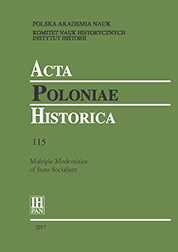Biopolitics and (Non-)Modernity. Population Micro-Policy, Expert Knowledge and Family in Late-Communist Poland
Biopolitics and (Non-)Modernity. Population Micro-Policy, Expert Knowledge and Family in Late-Communist Poland
Author(s): Barbara Klich-Kluczewska Subject(s): Economic history, Political history, Social history, Gender history, Post-War period (1950 - 1989)
Published by: Instytut Historii im. Tadeusza Manteuffla Polskiej Akademii Nauk
Keywords: biopolitics;modernisation;pro-natalistic policy;People’s Republic of Poland (PRL);history of family life;
Summary/Abstract: This article seeks to investigate the problem of modernity in post-war communist Poland (People’s Republic of Poland, Pol.: Polska Rzeczpospolita Ludowa, PRL) through the prism of concepts and ideas of model family and possibilities of shaping it, as promoted in the expert discourse and guidance practices. On the interpretation level, it is important to refer to modern – that is, rational and expert knowledgepropelled – social control methods, strictly connected with the concepts or ideas of modern society. The crucial aspect is the tension between biopolitics understood in terms of actions and strategies of modern dictatorship devised to control a population and the concepts of modernity that appeared in expert discourses in the context of, i.a., decreasing natality, modern birth control methods or practices related to maternity/paternity. Analysed are experts’ opinions proving dominant in the discourse, including the arguments put forth at sessions of the Family Council and the Planned Parenthood Association.
Journal: Acta Poloniae Historica
- Issue Year: 2017
- Issue No: 115
- Page Range: 151-174
- Page Count: 24
- Language: English

